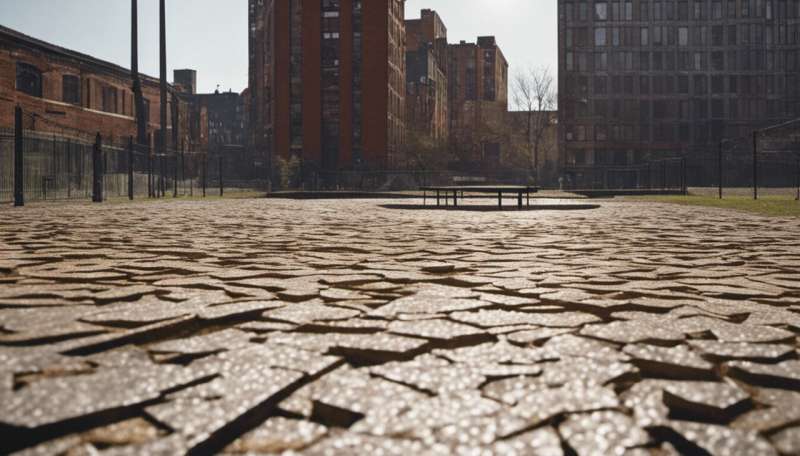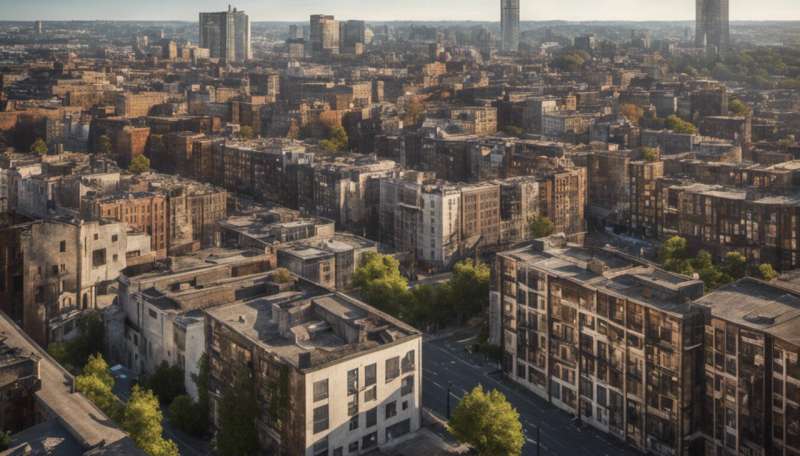Inequality is deliberately built into cities: segregated playgrounds are just the start

Developers in London have come under scrutiny for segregating people who live in social or affordable housing from residents who pay market rates. Prominent cases have included children from social housing being blocked from using a playground in a new development, and "poor doors" providing separate entrances for social housing residents.
Of course, segregation has long been a reality in cities around the world. For example, gated communities have been documented in the US cities since the 1970s, while racially segregated urban areas existed in South Africa under apartheid. Research by myself and other academics has shown that urban spaces which divide and exclude society's poorer or more vulnerable citizens are still expanding rapidly, even replacing public provision of facilities and services – such as parks and playgrounds – in cities around the world.
Gated developments in Gurgaon, India, have created a patchwork of privatised services; elite developments in Hanoi, Vietnam, offer rich residents cleaner air; and luxury condos in Toronto, Canada, displace local residents in favour of foreign investors. An extreme example is the Eko Atlantic project in Nigeria – a private city being built in Lagos, where the majority of other residents face extreme levels of deprivation and poverty.
A commodity, or a right?
Although these developments come with their own unique context and characteristics, they all have one thing in common: they effectively segregate city dwellers. By providing the sorts of facilities and services which would normally be run by public authorities, but reserving them exclusively for certain residents, such developments threaten the wider public's access to green spaces, decent housing, playgrounds and even safe sewage systems.
Access to basic services, which was once considered to be the right of all citizens, is at risk of becoming a commodity. Privatisation may start with minor services such as the landscaping or upkeep of neighbourhoods: for example, the maintenance of some new-build estates in the UK are being left to developers in return for a service charge. This might seem insignificant, but it introduces an unregulated cost for the residents.
Privatising the provision of municipal services may be seen by some as a way for wealthier residents to enjoy a better standard of living – as in Hanoi. But in the worst cases, it puts in a paywall in front of fundamental services such as sewage disposal – as happened in Gurgaon. In other words, privatisation may start with insignificant services and expand to more fundamental ones, creating greater segregation and inequality in cities.
A divided city
My own research on branded housing projects in Turkey has highlighted the drastic consequences of the gradual expansion of exclusive services and facilities through segregated developments. These private housing developments – known for their extensive use of branding – have sprung up in Istanbul and other Turkish cities over the past two decades, since the government began to favour a more neoliberal approach.
By 2014, there were more than 800 branded housing projects in Istanbul alone. They vary in scale from a single high-rise building to developments aiming to accommodate more than 20,000 residents. Today, this development type can be seen in every city in Turkey, from small towns to the largest metropolitan areas.

The branded housing projects are segregated by design, often featuring a single tower or an enclosing cluster of buildings, as well as walls and fences. They provide an extensive array of services and facilities exclusively for their residents, including parks, playgrounds, sports pitches, health clinics and landscaping.
Making the same services and facilities available within each project, effectively prevents interaction between residents and people living outside of their development. What's more, these projects often exist in neighbourhoods which lack publicly accessible open spaces such as parks and playgrounds.
This is a citywide problem in Istanbul since the amount of publicly accessible green spaces in Istanbul is as low as 2.2% of the total urban area. In London, 33% of the city's area is made up of parks and gardens open to the public – which shows the severity of the problem in Istanbul.
These branded housing projects do not feature any affordable units or social housing, so there are no opportunities for less privileged city-dwellers to enjoy vital facilities such as green spaces. This has knock-on effects on excluded residents' mental and physical health, contributing to greater inequality in these respects, too.
Emerging alternatives
To prevent increasing inequality, exclusion and segregation in cities, fundamental urban services must be maintained or improved and kept in public ownership and made accessible for every city-dweller. There are emerging alternatives that show ways to do this and challenge privatisation policies.
For example, in some cities, local governments have "remunicipalised" key services, bringing them back into public ownership. A report by Dutch think-tank the Transnational Institute identified 235 cases where water supplies were remunicipalised across 37 countries between 2000 and 2015. The water remunicipalisation tracker keeps track of successful examples of remunicipalisation cases around the world, as well as ongoing campaigns.
It is vitally important to keep urban services public and reverse subtle forms or privatisation by focusing on delivering a decent standard of living for all residents. Local authorities need to be committed to this goal – but they must also receive adequate funds from local taxes and central governments. Only then, will quality services be available to all people living in cities.
Provided by The Conversation
This article is republished from The Conversation under a Creative Commons license. Read the original article.![]()



















